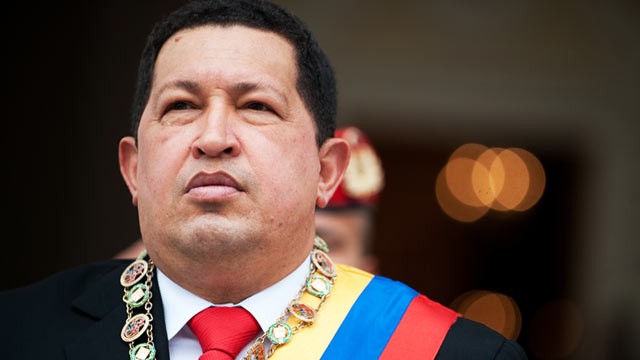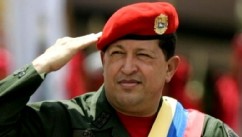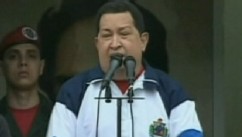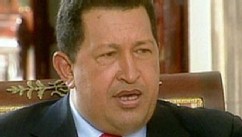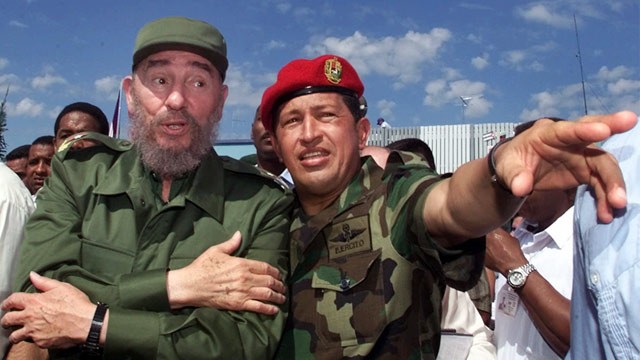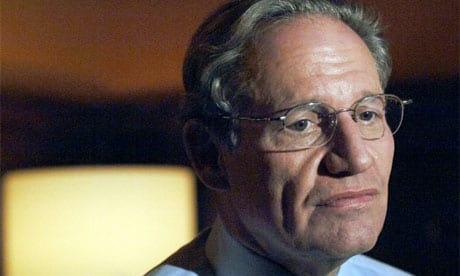[MEDIA WATCH] Pres. Chavez Dies: The ABC News treatment
THIS clip is from ABC Wold News with Diane Sawyer (3.5.13).
For some reasons this clip shows a bit more balance and the poison is lighter but still powerful enough to distort the impact of the piece. The good part is that somehow they made the decision to allow Hugo Chavez to say a few words uninterrupted and unedited. It should be noted that a “think piece” accompanying the page on the ABC World News site by Russell Goldman applies further antiseptic to Chavez’ message. (See inflammatory terms and unsupported assumptions, including lies, sprinkled throughout in bold in the transcript below. Annotations in brackets.)—Patrice Greanville
Grade: C-
 Hugo Chavez, Venezuela’s fiery [“fiery” always suggests “unstable”] and controversial socialist president who came to power on a wave of popular sentiment and befriended some of the world’s most notorious dictators, has died at the age of 58, Venezuelan Vice President Nicolas Maduro said today. Chavez had been fighting cancer, recently seeking treatment at a clinic in Cuba. A self-described champion of the poor [Hmm..egotist, he calls himself something. Actually the masses called him “champion of the poor”.] who first tried to overturn Venezuela’s powerful elites in a failed 1992 coup, Chavez was democratically elected in 1999, with huge support from the country’s poor. During his time in office, he became one of Latin America’s most well-known and polarizing figures. A constant thorn in the side of the United States [you mean the ruling cliques, not the people], he commanded headlines in newspapers around the world. A populist who suppressed free speech [a complete and total lie], he remained immensely popular among his country’s poor. From the time he won election in 1999, Chavez held onto power through tightly controlling the media [Again, a laughable lie; anyone could read anything in Venezuela, and the media, controlled by the rich, disseminated constant lies and provocations without official censure. Venezuela always had under Chavez and still has, a much broader spectrum of information and opinion than America, where systemic criticism is completely suppressed.]. and through a series of populist elections and referenda, including one that allowed him to seek a limitless number of terms. [Suggestions of seeking dictator for life position] PHOTOS: Hugo Chavez Through the Years Chavez, whose public appearances diminished in recent months, received his first surgery and chemotherapy treatment for cancer in Cuba in 2011. He returned to Cuba, a guest of that country’s ailing socialist leader Fidel Castro, for treatment and surgery in February 2012.
Hugo Chavez, Venezuela’s fiery [“fiery” always suggests “unstable”] and controversial socialist president who came to power on a wave of popular sentiment and befriended some of the world’s most notorious dictators, has died at the age of 58, Venezuelan Vice President Nicolas Maduro said today. Chavez had been fighting cancer, recently seeking treatment at a clinic in Cuba. A self-described champion of the poor [Hmm..egotist, he calls himself something. Actually the masses called him “champion of the poor”.] who first tried to overturn Venezuela’s powerful elites in a failed 1992 coup, Chavez was democratically elected in 1999, with huge support from the country’s poor. During his time in office, he became one of Latin America’s most well-known and polarizing figures. A constant thorn in the side of the United States [you mean the ruling cliques, not the people], he commanded headlines in newspapers around the world. A populist who suppressed free speech [a complete and total lie], he remained immensely popular among his country’s poor. From the time he won election in 1999, Chavez held onto power through tightly controlling the media [Again, a laughable lie; anyone could read anything in Venezuela, and the media, controlled by the rich, disseminated constant lies and provocations without official censure. Venezuela always had under Chavez and still has, a much broader spectrum of information and opinion than America, where systemic criticism is completely suppressed.]. and through a series of populist elections and referenda, including one that allowed him to seek a limitless number of terms. [Suggestions of seeking dictator for life position] PHOTOS: Hugo Chavez Through the Years Chavez, whose public appearances diminished in recent months, received his first surgery and chemotherapy treatment for cancer in Cuba in 2011. He returned to Cuba, a guest of that country’s ailing socialist leader Fidel Castro, for treatment and surgery in February 2012.
Chavez announced on Dec. 8 on state television that he would travel back to Cuba to undergo surgery since his pelvic cancer had “returned.” Despite his ailing health, Chavez was reelected last year. Chavez was born in 1954 in the town of Sabenta, Venezuela. Both his parents were schoolteachers. A military academy graduate and a decorated paratrooper, in the 1980s he and a group of officers founded an underground socialist organization named for the 19th century South American revolutionary Simon Bolivar. Full Coverage: Hugo Chavez In 1992 that group, the Revolutionary Bolivarian Movement, led a failed coup that ended with 18 people killed and Chavez imprisoned. Chavez spent two years in prison before receiving a pardon. After leaving prison, he rebranded his movement into a populist party called the Movement of the Fifth Republic and replaced his military uniform with business attire, or oftentimes a red shirt or red track suit.
Venezuela has one of the longest democratic traditions in Latin America, but by the early 1990s many of the country’s working and middle class people were disenchanted with the country’s two primary political parties, both of which suffered from endemic corruption.
Chavez, an icon from his prison days, promised to rid the country of corruption and pledged to divert revenue from the country’s ample oil sales to projects aimed at helping the poor, including improved education and health care. Unemployment and poverty, however, remain high despite the country’s oil wealth. Always the firebrand, Chavez created a series of bogeymen on which the Venezuelan people could pin their frustrations, firing jabs at traditional spheres of power and influence, including the oil companies, the Catholic Church and the United States. [The reporter is here defending these powerful political players as if they were totally innocent in the decades-long suppression and exploitation of the poor. In fact, all three have a long history of support for dictatorships and strongmen of the right, willing to do the bidding for the ultra-rich, hence to fault Chavez for denouncing them, as if they were angels, is rank In a public address he once said of oil executives that they live in “luxury chalets where they perform orgies, drinking whisky.” [Quite true, of course. Especially rankling in a nation where the overwhelming majority lived like animals.] His greatest ire, however, was [deservedly] saved for the United States, particularly former President George W. Bush. He called Bush a “liar,” “coward,” “murderer” and “donkey.” In a 2006 speech before the UN General Assembly, he called the U.S. president “the devil.” “I think I’m just saying what many people would like to tell him. I said he was a donkey because, I think, he’s very ignorant about what is actually happening in Latin America and the world,” Chavez told ABC’s Barbara Walters in a 2007 interview. [Anyone has a problem with that? Or has Bush now become an intellectual? Apparently, the simple truth bothers the apologists for the US corporatist state.]
He further needled the United States by closely allying himself with some of America’s enemies, including Castro and Iranian President Mahmoud Ahmadinejad. Despite promises that he would clean the country of corruption, his administration was rife with corruption. [A wild exaggeration, and look who’s talking, as if America was a land without corruption.] He and his government were routinely criticized for human rights abuses, particularly restricting freedom of the press. [Both accusations were simply fabrications using suspect sources to pin a wave of media attacks on Venezuela’s president and his Bolivarian project.]

